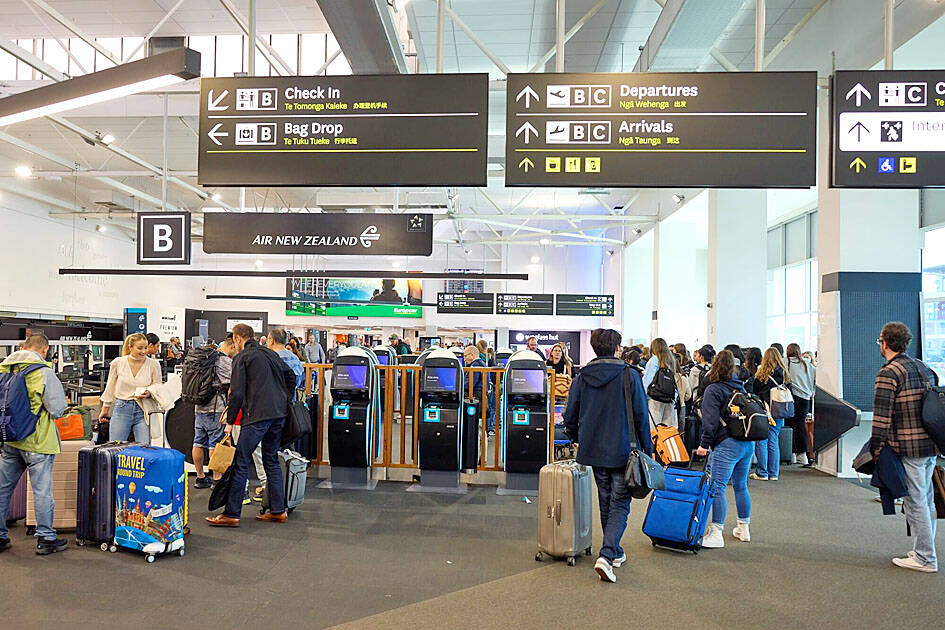New Zealand yesterday became the eighth country to open its e-Gate service to Taiwanese biometric passport holders, two ministries said.
The Ministry of the Interior and the Ministry of Foreign Affairs in separate statements said that they had been working with New Zealand’s immigration agency to make the service possible.
Taiwanese biometric passports holders traveling to New Zealand for leisure, business or educational purposes can now use the e-Gate upon arrival, the ministries said.

Photo: Bloomberg
However, travelers still need to complete the New Zealand Traveler Online Declaration form at least 24 hours before entering the country to obtain e-Gate access, they said.
New Zealand is the eighth country to grant e-Gate access to Taiwanese passport holders, after South Korea, Australia, Italy, Germany, Singapore, Malaysia and the US.
In line with Taiwan’s policy of reciprocal e-Gate use, plans are underway to provide the same service to holders of New Zealand biometric passports by next month or December, the ministries said.
Annual travel between Taiwan and New Zealand averages about 60,000 people, they said.

Taiwanese can file complaints with the Tourism Administration to report travel agencies if their activities caused termination of a person’s citizenship, Mainland Affairs Council Minister Chiu Chui-cheng (邱垂正) said yesterday, after a podcaster highlighted a case in which a person’s citizenship was canceled for receiving a single-use Chinese passport to enter Russia. The council is aware of incidents in which people who signed up through Chinese travel agencies for tours of Russia were told they could obtain Russian visas and fast-track border clearance, Chiu told reporters on the sidelines of an event in Taipei. However, the travel agencies actually applied

Japanese footwear brand Onitsuka Tiger today issued a public apology and said it has suspended an employee amid allegations that the staff member discriminated against a Vietnamese customer at its Taipei 101 store. Posting on the social media platform Threads yesterday, a user said that an employee at the store said that “those shoes are very expensive” when her friend, who is a migrant worker from Vietnam, asked for assistance. The employee then ignored her until she asked again, to which she replied: "We don't have a size 37." The post had amassed nearly 26,000 likes and 916 comments as of this

New measures aimed at making Taiwan more attractive to foreign professionals came into effect this month, the National Development Council said yesterday. Among the changes, international students at Taiwanese universities would be able to work in Taiwan without a work permit in the two years after they graduate, explainer materials provided by the council said. In addition, foreign nationals who graduated from one of the world’s top 200 universities within the past five years can also apply for a two-year open work permit. Previously, those graduates would have needed to apply for a work permit using point-based criteria or have a Taiwanese company

The Shilin District Prosecutors’ Office yesterday indicted two Taiwanese and issued a wanted notice for Pete Liu (劉作虎), founder of Shenzhen-based smartphone manufacturer OnePlus Technology Co (萬普拉斯科技), for allegedly contravening the Act Governing Relations Between the People of the Taiwan Area and the Mainland Area (臺灣地區與大陸地區人民關係條例) by poaching 70 engineers in Taiwan. Liu allegedly traveled to Taiwan at the end of 2014 and met with a Taiwanese man surnamed Lin (林) to discuss establishing a mobile software research and development (R&D) team in Taiwan, prosecutors said. Without approval from the government, Lin, following Liu’s instructions, recruited more than 70 software